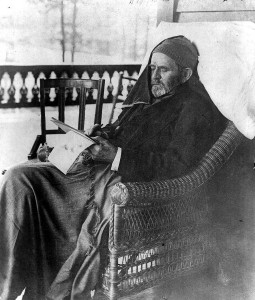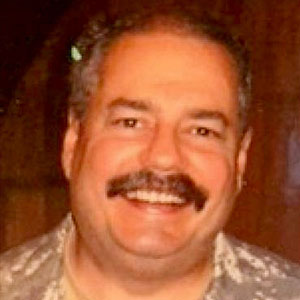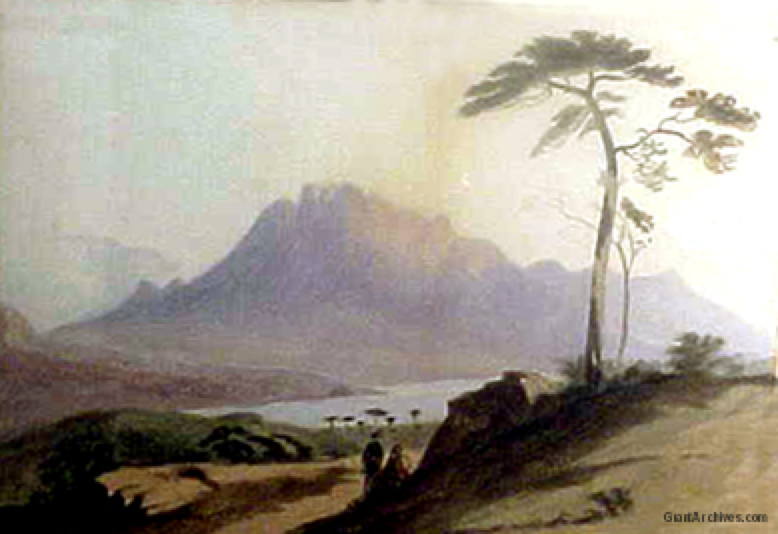 He knows the capsule biography of Ulysses S Grant. Academy cadet, Brilliant equestrian, struggling alcoholic, Civil War general, President beset by a corrupt cabinet.
He knows the capsule biography of Ulysses S Grant. Academy cadet, Brilliant equestrian, struggling alcoholic, Civil War general, President beset by a corrupt cabinet.
At the very end of his life, but it was clear he was going to die, he wrote, and then when too weak to write, dictated, one of the better sets of memoirs to come out of the War Between the States. That’s what he’s doing in this picture of Grant as a frail old man.
Everybody seems to know he was a lush, and that’s why his first Army career tanked (no pun intended), but nobody seems to remember he was a kindly, gentle and sensitive man, loath to say a bad word about anyone. That his acceptance of Lee’s surrender was respectful of the pride of his Confederate peer and that of Lee’s officers and men was not just due to the timbre of the times, but was Grant’s personality coming out.
We were fascinated to learn that he was, like characters as distant from him in personality as Hitler and Churchill, an avid painter. Unlike those worthies, though, he seems to have been really good. It’s hard to judge, because there are only a few photos of original Grants on the web, but here’s one.
(Apologies for the size/resolution. It was the best we could do).
Perhaps it was common knowledge, but as we’re fond of saying, “not so common that we knew it.”

Kevin was a former Special Forces weapons man (MOS 18B, before the 18 series, 11B with Skill Qualification Indicator of S). His focus was on weapons: their history, effects and employment. He started WeaponsMan.com in 2011 and operated it until he passed away in 2017. His work is being preserved here at the request of his family.


13 thoughts on “Never Knew This about Grant”
Had NO idea he was a painter. Pears he did have some talent.
Was he working with Sam’l Clemens on his bio? I seem to remember some good correspondence between the two.
Yes. At the time, Grant had been swindled (again) and was not just facing death, but leaving his family destitute as well. Clemens stepped in, helped get the book published, and delivered the first royalty check to Grant’s widow, Julia — a record setting $200,000.
Wow. 200.000 U$D. How much is that in today’s dolares? Must be a million or so.
According to “Secret Lives of the Civil War ” Grants autobiography was published by Mark Twain. And it did not mention painting.
Books are allwas good Christmas presents Thanks Roger.
Second paragraph, a minor niggle:
“At the very end of his life, but it was clear he was going to die, he wrote, and then went to week to write, dictated, one of the better sets of memoirs to come out of the War Between the States.”
I doubt the forthcoming festivities will feature much civility…more like 1917-1921 Bolsheviks vs Whites.
I heartily recommend Grant’s memoirs. Even if you aren’t interested in the history, his prose is delicious – second only to Churchill, IMHE.
FWIW W. T. Sherman was an amateur painter as well, with some positive consequences for a certain southern belle; from Sherman’s memoirs:
http://www.gutenberg.org/files/4361/4361-h/4361-h.htm
February 17th, Colombia SC
“It so happened that, when I was a lieutenant at Fort Moultrie, in 1842-’46, I used very often to visit a family of that name on the east branch of Cooper River, about forty miles from Fort Moultrie, and to hunt with the son, Mr. James Poyas, an elegant young fellow and a fine sportsman. His father, mother, and several sisters, composed the family, and were extremely hospitable. One of the ladies was very fond of painting in water-colors, which was one of my weaknesses, and on one occasion I had presented her with a volume treating of water-colors.”…”After inquiring about her father, mother, sisters, and especially her brother James, my special friend, I could not help saying that I was pleased to notice that our men had not handled her house and premises as roughly as was their wont. “I owe it to you, general,” she answered. “Not at all. I did not know you were here till a few minutes ago.” She reiterated that she was indebted to me for the perfect safety of her house and property, and added, “You remember, when you were at our house on Cooper River in 1845, you gave me a book;” and she handed me the book in question, on the fly leaf of which was written: “To Miss Poyas, with the compliments of W. T. Sherman, First-lieutenant Third Artillery.”
A funny scene from the very silly ‘They Died with Their Boots On’, with Errol Flynn (!?!) as Custer. Flynn, standing in a restaurant, at a table full of Union officers, being questioned about his time at West Point.
“Horsemanship?” “First Class”.
“This ‘n that”? “First class”.
“Academic this…”? Looks glum and lowers his head.
“Academic that…”? Looks glummer and shakes his head side to side.
Someone says, “Worse than Grant”? Nods in the affirmative.
Then, from the far end of the table a voice is heard, “Say, what ever happened to Grant”?
Skip the rest of the movie.
When was this restaurant conversation supposed to have happened? During the early Civil War?
Because, if not, that whole thing just doesn’t work-Grant was Class of 1843, Custer was Class of 1862, and I seriously doubt that he’d have any idea who the hell Grant was, being that Grant was semi-obscure then. And, Grant did manage to graduate at 21st in a class of 39 students, respectably middle-ranking.
Gaaah… Hollywood: What they don’t lie about, they misunderstand and mis-explain.
Yes, early Civil War. But, c’mon, Errol Flynn, Olivia de Haviland, Anthony Quinn as Sitting Bull, Sidney Greenstreet as Winfield Scott Hancock. It’s funnier in the movie than just up the page there.
R E Lee was also a gifted and talented artist. His hand drawn and water colored maps are beautiful. I admire Lee And Grant greatly and not so much for their martial abilities ( which were genius) but for their personalities.
finished a biography of grant this fall and it did note both his interest in painting and his memoirs being pushed by Clemens through a paid subscription plan through I think Colliers magazine. this enabled the cheque to be presented to Mrs. Grant before the President’s death so he knew the family would not be destitute.
Bruce Catton’s U.S. Grant and the American Military Tradition is a wonderful little book. It’s a good introduction – or reintroduction – to Grant’s memoirs.
Catton points the irony of Grant dying of throat cancer (which was probably caused by the cigars which he didn’t smoke much until given them by an admirer, and which then flooded in when they became part of his public image.) Catton also, I remember correctly, used Grant’s “I propose to fight it out on this line if it takes all summer” to describe the last stages of his writing his memoirs and called attention to Grant’s tenacity and dogged courage – he minimized his use of opiates to keep his mind clear for writing, and then dictating and editing as his strength failed.